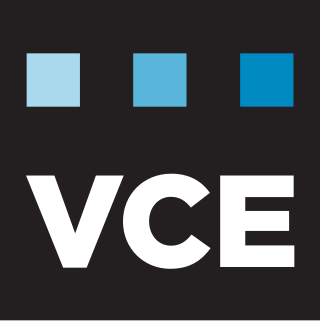
Dell EMC is an American multinational corporation headquartered in Hopkinton, Massachusetts, and Round Rock, Texas, United States. Dell EMC sells data storage, information security, virtualization, analytics, cloud computing and other products and services that enable organizations to store, manage, protect, and analyze data. Dell EMC's target markets include large companies and small- and medium-sized businesses across various vertical markets. The company's stock was added to the New York Stock Exchange on April 6, 1986, and was also listed on the S&P 500 index.
NetApp, Inc. is an intelligent data infrastructure company that provides unified data storage, integrated data services, and cloud operations (CloudOps) solutions to enterprise customers. The company is based in San Jose, California. It has ranked in the Fortune 500 from 2012 to 2021. Founded in 1992 with an initial public offering in 1995, NetApp offers cloud data services for management of applications and data both online and physically.

Data corruption refers to errors in computer data that occur during writing, reading, storage, transmission, or processing, which introduce unintended changes to the original data. Computer, transmission, and storage systems use a number of measures to provide end-to-end data integrity, or lack of errors.
Lempel–Ziv–Oberhumer (LZO) is a lossless data compression algorithm that is focused on decompression speed.

Bryan M. Cantrill is an American software engineer who worked at Sun Microsystems and later at Oracle Corporation following its acquisition of Sun. He left Oracle on July 25, 2010, to become the Vice President of Engineering at Joyent, transitioning to Chief Technology Officer at Joyent in April 2014, until his departure on July 31 of 2019. He is now the CTO of Oxide Computer company.
Data scrubbing is an error correction technique that uses a background task to periodically inspect main memory or storage for errors, then corrects detected errors using redundant data in the form of different checksums or copies of data. Data scrubbing reduces the likelihood that single correctable errors will accumulate, leading to reduced risks of uncorrectable errors.

3PAR Inc. was a manufacturer of systems and software for data storage and information management headquartered in Fremont, California, USA. 3PAR produced computer data storage products, including hardware disk arrays and storage management software. It became a wholly owned subsidiary of Hewlett Packard Enterprise after an acquisition in 2010.
Sun Open Storage was an open source computer data storage platform developed by Sun Microsystems. Sun Open Storage was advertised as avoiding vendor lock-in.
ZFS+ is a combined file system and logical volume manager software subsystem initially released under the Common Development and Distribution License (CDDL). It is based on ZFS, originally developed by Sun Microsystems, with proprietary data deduplication features added by GreenBytes and subsequently made proprietary for a storage system product. GreenBytes originally owned the trademark on ZFS+, not to be confused with the ZFS trademark currently held by Oracle Corporation.
A hybrid array is a form of hierarchical storage management that combines hard disk drives (HDDs) with solid-state drives (SSDs) for I/O speed improvements.
RecoverPoint is a continuous data protection product offered by Dell EMC which supports asynchronous and synchronous data replication of block-based storage. RecoverPoint was originally created by a company called Kashya, which was bought by EMC in 2006.

Virtual Computing Environment Company (VCE) was a division of EMC Corporation that manufactured converged infrastructure appliances for enterprise environments. Founded in 2009 under the name Acadia, it was originally a joint venture between EMC and Cisco Systems, with additional investments by Intel and EMC subsidiary VMware. EMC acquired a 90% controlling stake in VCE from Cisco in October 2014, giving it majority ownership. VCE ended in 2016 after an internal division realignment, followed by the sale of EMC to Dell.
GreenBytes was an American company providing inline deduplication data storage appliances and cloud-scale IO-Offload systems. Robert Petrocelli founded the company in 2007. On May 15, 2014, it was acquired by Oracle Corporation.

Nexenta by DDN, Inc., is a subsidiary of DataDirect Networks that sells computer data storage and backup software. It is headquartered in San Jose, California. Nexenta developed NexentaStor, NexentaCloud, NexentaFusion, and NexentaEdge. It was founded as Nexenta Systems, Inc., in 2005.

Dell Technologies PowerFlex, is a commercial software-defined storage product from Dell Technologies that creates a server-based storage area network (SAN) from local server storage using x86 servers. It converts this direct-attached storage into shared block storage that runs over an IP-based network.
Michael W. Shapiro is an American computer programmer who worked in operating systems and storage at Sun Microsystems, Oracle, and EMC.
Dell EMC Data Domain was Dell EMC’s data deduplication storage system. Development began with the founding of Data Domain, and continued since that company’s acquisition by EMC Corporation.
ZFS is a file system with volume management capabilities. It began as part of the Sun Microsystems Solaris operating system in 2001. Large parts of Solaris – including ZFS – were published under an open source license as OpenSolaris for around 5 years from 2005 before being placed under a closed source license when Oracle Corporation acquired Sun in 2009–2010. During 2005 to 2010, the open source version of ZFS was ported to Linux, Mac OS X and FreeBSD. In 2010, the illumos project forked a recent version of OpenSolaris, including ZFS, to continue its development as an open source project. In 2013, OpenZFS was founded to coordinate the development of open source ZFS. OpenZFS maintains and manages the core ZFS code, while organizations using ZFS maintain the specific code and validation processes required for ZFS to integrate within their systems. OpenZFS is widely used in Unix-like systems.
Qumulo is an American data storage company based in Seattle, Washington. Founded in 2012, it offers products and services to help other companies manage and curate large amounts of data.







